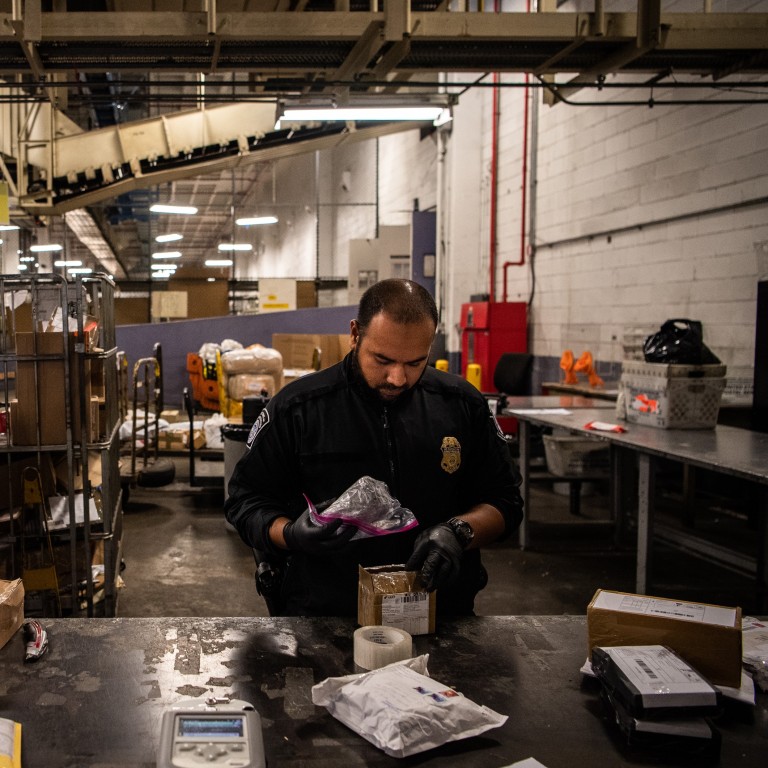
China accuses US of using fentanyl as a political weapon as Donald Trump orders shipping firms to step up checks
- Head of country’s national drugs regulator says Washington is politicising the issue accusing politicians of ‘upending the facts’ for their own purposes
- US President issues Twitter tirade ordering American companies to step up searches for imports of the drug linked to opioid epidemic
The US is politicising the issue of illicit Chinese exports of fentanyl and using it as a weapon against China, the country’s narcotics regulator said on Friday.
Liu Yuejin, deputy head of China’s National Narcotics Control Commission, rejected accusations from the US that China was not doing enough to curb the flow of fentanyl, a highly addictive opioid painkiller, beyond its borders.
Some American politicians “are upending the facts for their own political necessities,” Liu said in an interview in Beijing on Friday.
The comments come just weeks after President Donald Trump lashed out at his Chinese counterpart in a tweet, saying Xi Jinping failed to stop the flow of Chinese-made fentanyl as promised, and cited this failure as one reason that another 10 per cent tariff would be levied on US$300 billion of Chinese exports on September 1.
In a series of new tweets on Friday, Trump said that he would order US shipping companies to search for and reject any packages containing fentanyl, from China or any other country.
FedEx already has extensive security measures to prevent the use of its network for illegal purposes, the company said in a statement.
United Parcel Service said it works closely with authorities to monitor for prohibited substances, and takes a “multilayered” approach to prevent such shipments. Amazon did not respond to a request for comment.
The US Postal Service said it was “aggressively working” to implement the provisions of an existing law to keep illicit drugs from entering the US.
Liu said Chinese authorities have been closely cooperating with their American counterparts on the issue of the three men, but that the individuals’ actions occurred before China’s tightening of its laws regulating the drug in April.

“It was hard to prosecute them with the law at that time and US enforcement knows this very clearly,” he said. “Some US politicians refuse to face the reality, upend the facts, turn black into white and muddy clear water. And they mislead Americans who may not know the truth.”
Fentanyl has played a role in the opioid epidemic that has been blamed for thousands of overdose deaths in the US and been declared a public health emergency.
It has also been an issue in trade war negotiations. Last year, China’s move to tighten supervision and revise rules around fentanyl production after the two presidents met at the Group of 20 summit in Argentina was talked up by Trump as a major concession.
But earlier this month, he tweeted that “my friend President Xi said that he would stop the sale of Fentanyl to the United States – this never happened, and many Americans continue to die!”
The three Chinese nationals, Zheng Fujing, Zheng Guanghua and Yan Xiaobing, were added to the US Treasury’s “Specially Designated Nationals List” earlier this week for running what the agency said was “an international drug trafficking operation that manufactures and sells lethal narcotics, directly contributing to the crisis of opioid addiction, overdoses and death in the US.” The move allows the government to freeze their US-based financial assets.
“These actions by the US are not constructive and will hurt the good relationship between the two countries’ law enforcement organs,” said Liu. He added that China is still open to working with the US on the fentanyl problem.
China has repeatedly pushed back against the claim that it is responsible for the fentanyl problem, arguing that the epidemic is due to America’s own lax regulation over the prescription of addictive opioids to patients. Liu pointed out that China does not have a domestic opioid abuse problem because of its strict regulation over the use of painkillers.

